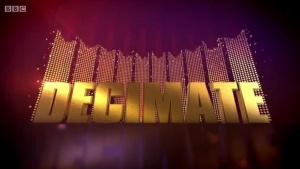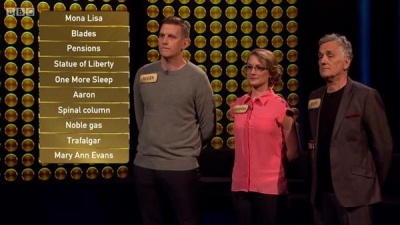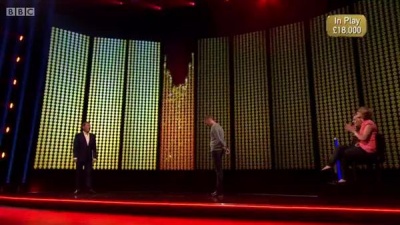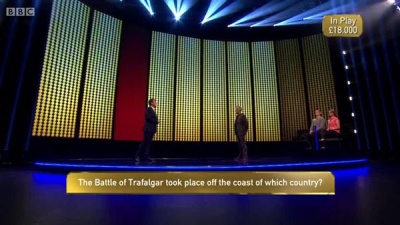Decimate
(→Broadcast) |
(→Broadcast) |
||
| (One intermediate revision not shown) | |||
| Line 10: | Line 10: | ||
CPL Productions for BBC One, 20 April 2015 to 28 October 2016 (75 episodes in 3 series) | CPL Productions for BBC One, 20 April 2015 to 28 October 2016 (75 episodes in 3 series) | ||
| - | |||
| - | |||
</div> | </div> | ||
Current revision as of 21:51, 22 April 2023
Contents |
Host
Broadcast
CPL Productions for BBC One, 20 April 2015 to 28 October 2016 (75 episodes in 3 series)
Synopsis
Teams defend £20,000 through questions in front of a large wall of lights.
Decimate is played by teams of three players. At the start, the video wall is filled with thousands of golden lights, each representing some money. The players' aim is to hold on to as much of that loot as they can; perfect play will let them take home £20,000. The prize money is split into ten equal segments, initially each is worth £2000.
Before round one, the team is shown ten "key words", they'll appear in the questions. One of the team emerges to play the round, either through volunteering or being told "you do it". The other members get twenty seconds to talk about the "key words".
The chosen player joins Shane Richie in the middle of the stage. The other two players sit on the subs' bench, with nothing more than a large buzzer for company. Shane asks a question, and gives three possible answers. The contender thinks about the three possible answers, and thinks out loud.
A correct answer defends the money in that segment. An incorrect answer loses that segment from the game. After a round ends, any gaps are filled by levelling the other segments. So if a team gets three wrong in the opening round, they've £14,000 left, and round two questions will be for £1400.
Right answers are marked by a musical chord, pleasant and immemorable. Wrong answers are heralded by a big deep voice booming "DECIMATE!" in an ominous fashion, before the money drains from the video wall.
Five times in the whole show, the subs' bench can push a buzzer and over-rule the player in the middle. The original answer is tossed out, and replaced by the one picked by the pair of players. Should the player in the middle be completely stumped, he can pass the question back to the substitutes, again this happens just five times in the whole game.
The final round is a speed challenge. Again, the players are shown ten "keywords" (categories). They'll be asked up to three questions in each category, each question is meant to be easier than the last. Get any question right and the money is safe, the player moves on to the next category. They need to get something right in all ten segments in the time to win the money.
Fail on all three questions, the money is lost and the player must stop. Not only have they lost 10% of their money, but they've lost 20% of their time. Should all three players fail on the run, the team leaves with nothing.
The bulk of the game play is three rounds, played at about one question per minute, and for diminishing amounts of money. The final round is hard: wins are rare, but those rare wins are for several thousands of pounds.
There is a good show nestling within Decimate, but it's so painfully slow. Some have argued that the mechanism used on Decimate - "here's some money, defend it through being brilliant" - works less well than "you start with nothing and get rewards".
Inventor
Hugh Rycroft, who was also one of the show's executive producers. And the voice of "DE-CI-MATE!!!" voice heard when the coins fall from the wall.
Theme music
Nick Norton-Smith and David Roper are credited for "Music".
Trivia
In the first series, teams on Decimate applied as a team. Second and third series teams applied individually, which is… better, though there are surely other ways of quickening the game.
Earth London devised the show's graphics. The wall projection was done by Creative Technology.
The first fourteen episodes of the first series aired at 3pm, Episode 15, on 8 May 2015, moved to BBC Two at 3.30 owing to the Westminster election. The subsequent ten episodes moved back to BBC1 but at the later time of 3.45. The second and third series aired at 2.15 with the exception of the episode on 10 September 2015 (S2E4), which aired at 2.45pm to accommodate a double-length edition of daily drama Doctors.
Surprisingly, BBC2 repeated the second series in 2020, over five years after it had aired, possibly to help fill holes in the schedule caused by the COVID-19 pandemic.





